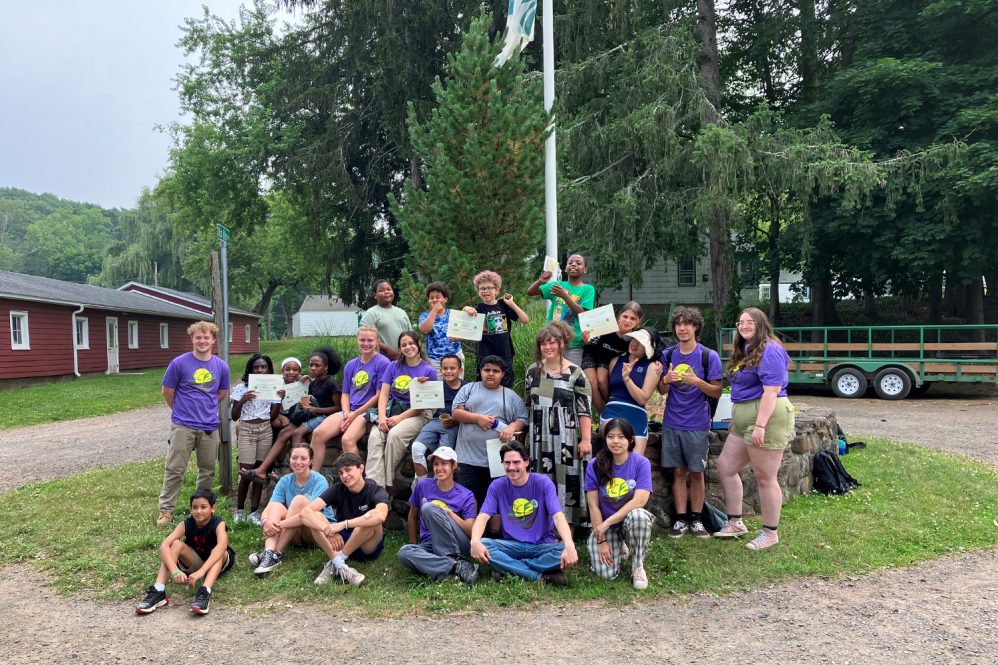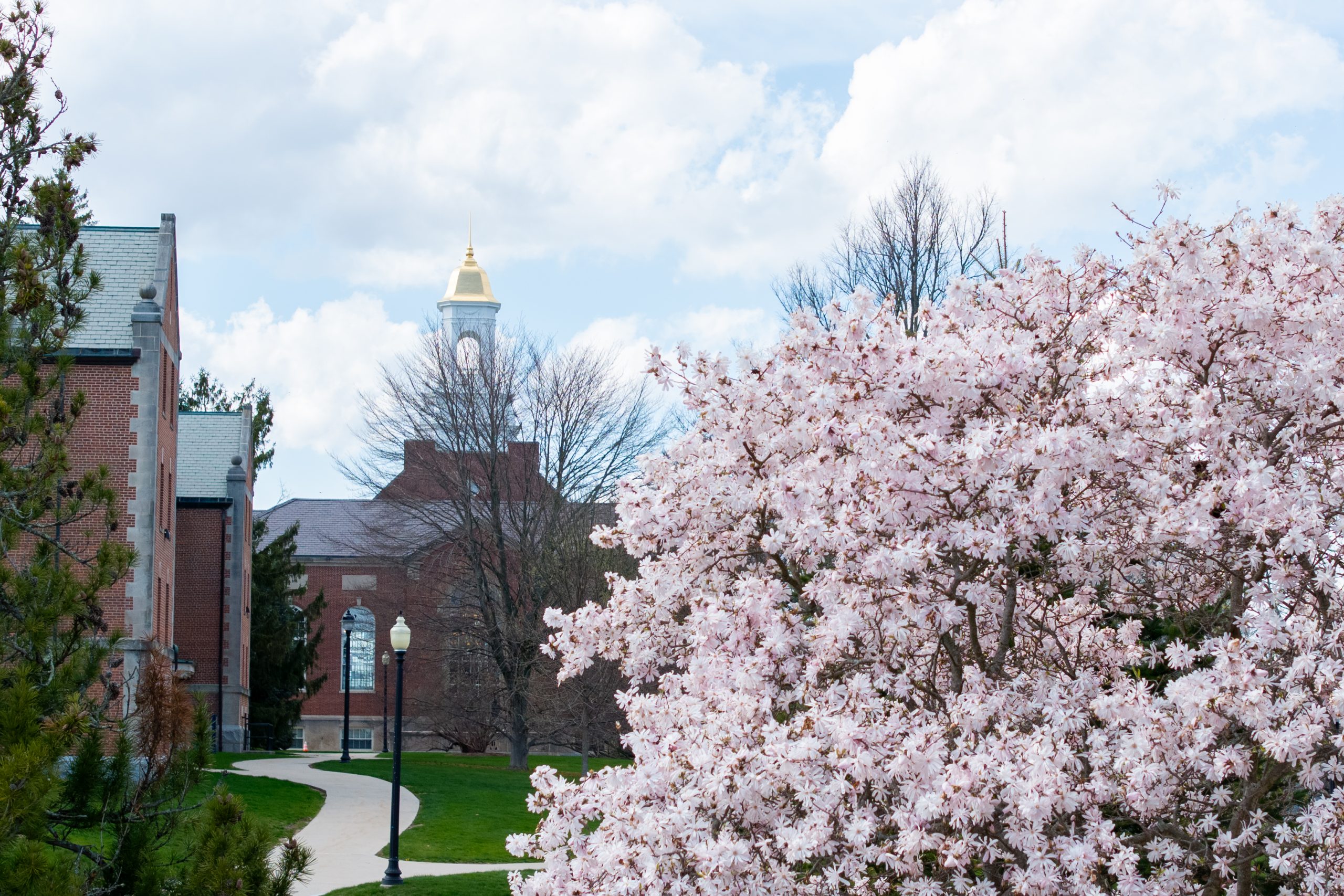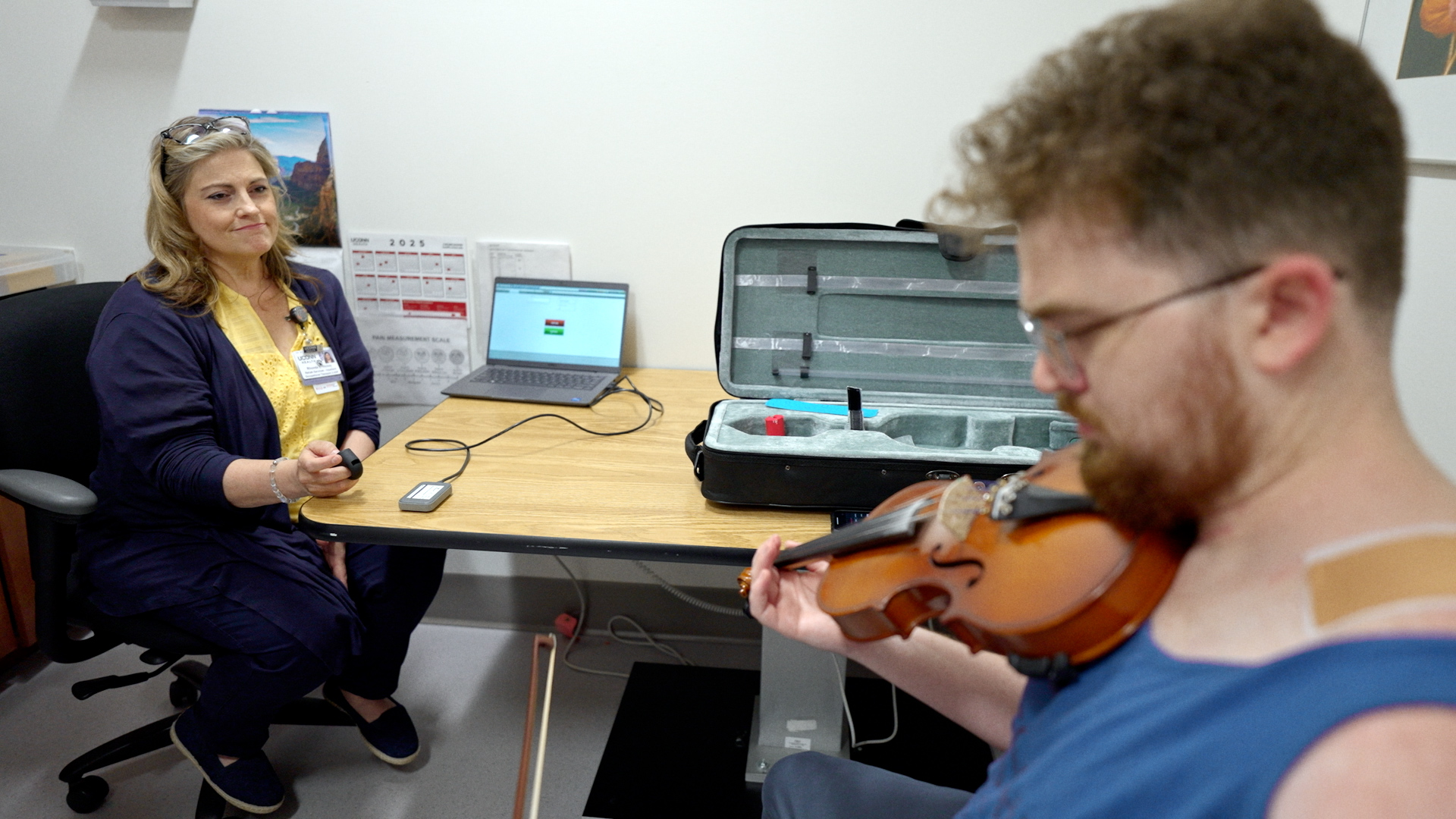In a bustling room of nine and ten-year-olds, Drew Nielsen ’23 (CLAS) does a series of claps in a pattern familiar to elementary and middle schoolers, a gesture that means an important announcement is coming.
Nielsen is one of 12 UConn student fellows from the Sustainable Community Food System (SCFS) program that combines topics of sustainability, environmentalism, and social justice to help students see pressing issues such as food insecurity and social injustice through a systemic lens. Fellows in this program learn skills both in the classroom and through service learning opportunities in local communities to help fellows become leaders in the shift to a more sustainable and equitable future.
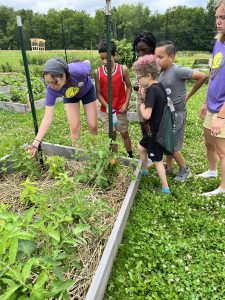
For one week at the end of June, the SCFS fellows led a program filled with creative activities to instill a deeper understanding of the topics needed to build stronger, more sustainable communities.
“OK everyone, we are ready to have lunch and it’s a very special lunch!” Nielsen calls out. “The fellows all prepared food that is very special to us, food from around the world. But before we line up, I want to try something different. Raise your hand and say something positive and kind about someone or something positive that has happened so far today.”
The children, rising 5th graders from the SAND School in North Hartford, are eager to answer. Nearly everyone’s positive statement reflects how excited they are to participate in this program.
The group is gathered in a classroom and teaching kitchen at Auerfarm in Bloomfield, just minutes from Hartford. SCFS Faculty Member and UConn College of Agriculture, Health and Natural Resources Extension Educator Jennifer Cushman explains that the property was gifted to the Connecticut 4-H Development Fund in 1976. Since then, UConn 4-H has had a strong presence on the farm with educational programming, says Cushman, now including the Sustainable Community Food Systems program that came to fruition this summer.
The farm is open to the public and is a perfect setting for learning about agriculture and community-based food systems.
“Lots of animals and gardens, there’s an apple orchard and blueberries, which we got to pick yesterday. There is a lot of great agricultural teaching space,” says Cushman. “These youth are engaged as UConn 4-H program participants this week.”
Nielsen explains the project was spearheaded by UConn Faculty from multiple disciplines and departments across the university, from the CAHNR to CLAS, to UConn’s Office of Outreach and Engagement including Co-principle investigators Professor-in-Residence of Sociology Phoebe Godfrey, Professor-in-Residence of Geography Andrew Jolly-Ballantine, Associate Extension Educator of Extension Jennifer Cushman and Assistant Professor-in-Residence Stacy Maddern.
The curriculum planning started with last year’s cohort of fellows working in collaboration with teachers from SAND school who were essential for the program’s success, explains Godfrey.

The SCFS faculty members approached this year’s cohort of fellows who have continued to work on planning activities and designing lessons for this year’s participants. Nielsen and another fellow, Ella Wilgis ’24 (CLAS) specialized in developing the curriculum.
“Before coming to Auerfarm, I was very nervous to lead and supervise meaningful programming for such a large group of young students, a sentiment that many of my peers shared,” says SCFS Fellow Maia Carpentino ‘24 (CAHNR).
“For many of us, this was our first time taking on the role of a mentor to such an impressionable group, but this nervousness quickly diminished as the week progressed and we got to know each other more. Ultimately, we learned that if we show passion around the topic of food systems, if we stay adaptable, and are in tune with the feelings and needs of the students, the students will have a great week and take home new interests and/or knowledge. We came into this experience expecting to be teachers, but the students taught us how to grow as academics and become better leaders,” says Carpentino.
The fellows quickly adapted activities to ensure everyone has the best experience. “The kids seem to be enjoying themselves,” says Nielsen. “They’re a very high-energy group so every night we meet up and modify our plan and rework the next day based on the day and what the kids enjoyed the most.”
The goal of the program is to introduce kids who may not have had the opportunity to experience a space like Auerfarm and get them thinking about where our food comes from, what types of food we eat, and how we get that food. The experience has also been rewarding for the fellows involved, Nielsen says.
“We want them to be asking these questions, we aren’t going too deep into the socio-political aspect of things like food apartheid, but we are trying to have them engage in the mindful practices so that when they’re older, they may start to notice and interact with those concepts and build towards a more equitable future. We’re hoping the conversations we’re having during those skill-building activities are going to prepare them to be activists in their community.”
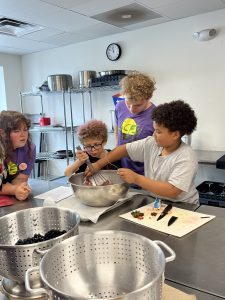
The days are structured so the children spend a lot of time in the teaching kitchen, learning how to plan and prepare their meals, from smoothies to guacamole, hummus, and sandwiches, the food preparation has been the reigning highlight of their day, says SCFS Program Coordinator Victoria Zucco ’23 (CLAS). They are having fun while building life skills.
“It’s been a process of finding the balance between indoor cooking, artwork, being outside in nature, playing, and finding interesting games,” Zucco says. “I think everyone’s consensus is that their favorite part of the program is all the good food that they’re getting to make and eat. Everything is also very egalitarian. We’ve been starting every day by reviewing the standards we set for ourselves. There’s a climate of respect and listening, rather than ridged rule-following.”
The program standards were agreed upon by the group and included things like “Do and Say Nice Things,” “Take Care of Yourself and Others,” and “Ask Questions!” to ensure a collaborative and fun environment for everyone.
“Kindness is our Word of the Week, and every day we ask how we can say and do nice things for everybody and create this community,” says Nielsen. “It’s not just fending for yourself, but everybody can pick each other up and create the type of environment where we can collaborate, that’s so different from what capitalism pushes onto us, that rigid individualism, instead we can come together as a community and do all this cool stuff that you wouldn’t have been able to do alone.”
SCFS faculty member and Associate Professor in the Department of Chemical and Biomolecular Engineering Kristina Wagstrom explains that faculty members are also learning from this experience as they help guide the fellows as they lead the participants:
“It’s a great chance for the fellows and the campers to learn about being part of the food system. We’re also learning a lot about communicating and how to bring it to other generations,” says Wagstrom.
As we contend with ongoing climate crisis-related changes, the importance of community becomes ever more apparent. Building these bonds and sharing knowledge is vital to create a just and sustainable future. We have the tools and resources; we need the human connection. The SCFS program illustrates this beautifully.
“I’m from Hartford and so are these kids,” says Nielsen. “I’d like to teach there and be a part of the community that helped me grow up. This experience has given me so many ideas about ways to build this social awareness into other areas of their education.”
Find more information on the Sustainable Food System Minor or Fellowship opportunities for Summer 2024 please visit the SCFS website here. The main grant supporting the program is a USDA/NIFA grant award 2021-69018-34644.
